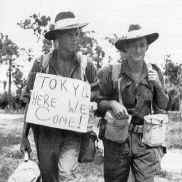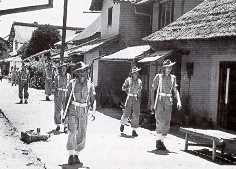On 15 August 1945, Australians rejoiced at the ending of the Second World War.

Marching off to peace (AWM 098322). For the last four years of the war Australia’s main war effort had been in the Pacific, fighting the Japanese. Nearly 30,000 Australians had died, many of those as prisoners of the Japanese. Thousands more were damaged physically and mentally as a result of that POW experience. When Japan surrendered to end the war, there were strong feelings among most Australians against that nation.
It was agreed by the Allies that the governments of the United Kingdom, Australia, India and New Zealand would each provide a contingent in the occupation of Japan. The force was to be known as the British Commonwealth Occupation Force (BCOF). Lieutenant General J. Northcott, an Australian, was appointed as Commander-In-Chief. Australia supplied Army, Navy and Air Force personnel and equipment as part of the multi-nation force.

Part of the task facing the Australian and other service men and women sent to Japan was also to help the war-torn Japanese nation to rebuild and recover. Japanese cities had been bombed savagely and millions of its soldiers and civilians had died. Its economy was shattered and it was facing the complete destruction of its traditional way of life and government. The Japanese people were stunned by the suddenness of their defeat. In the cities, crude shelters were being erected in the bombed areas. There were few shops or markets, and the population was still striving to provide itself with two necessities of life - shelter and food.
When war broke out in Korea in 1950, many of the BCOF troops were the first to be sent there as part of the United Nations force.
The Occupation of Japan lasted from 13 February 1946 through to the end of 1951 when the San Francisco Treaty was signed. In the British Commonwealth assigned occupation areas the burden fell to the Australians from the end of 1948. It was the Australian Government's policy to maintain a force in Japan as long as the occupation lasted.
Many veterans felt that they did not receive recognition for their service in BCOF. It was not until 1994 that a medal commemorating their service was authorised.





